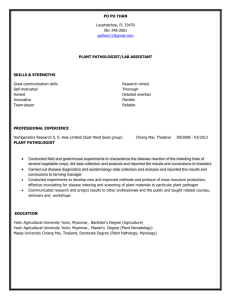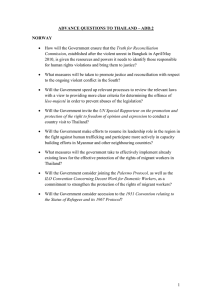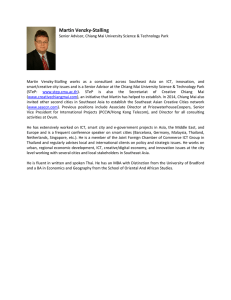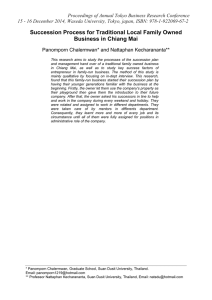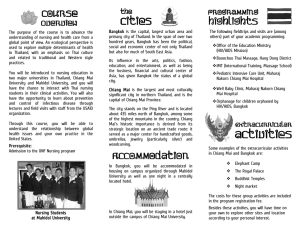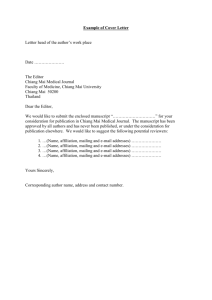– BREAKING THE ISOLATION DOMESTIC WORKERS IN THAILAND Brahm Press
advertisement
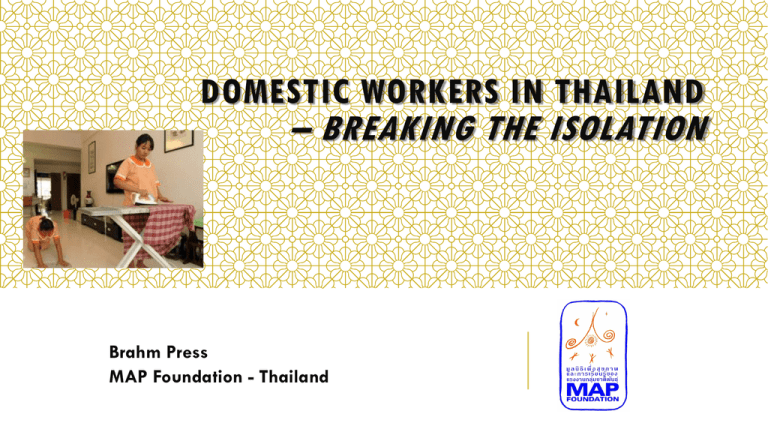
DOMESTIC WORKERS IN THAILAND – BREAKING THE ISOLATION Brahm Press MAP Foundation - Thailand MAP FOUNDATION 19 years working on migrants’ rights and health in Thailand CBO/NGO – most staff are migrants from Burma themselves Chiang Mai main office, sub-office in Mae Sot at the border, and networks along border, in the South, and in Bangkok and Mahachai area Programs: Labour Rights including organizing, OSH and Domestic Workers; Women’s empowerment; Youth SRHR; Access to education; HIV and TB prevention; Crisis support; Print and multi media in migrant languages as well as two radio stations – one in Shan and the other in Burmese DOMESTIC WORK – NOT RECOGNIZED Thailand has not ratified C189 Domestic workers are excluded from certain labour standards including: No minimum wage coverage No specified limitations on working hours / No overtime compensation No social security coverage (still considered informal sector) No maternity leave / No protection from dismissal for pregnancy No labour inspection to access private residence “intrusion of privacy” No controls on charges for documents by agents or employers no punishment for withholding documents DOMESTIC WORK – SMALL PROTECTIONS Government Ministerial Regulation no. 14 (Nov. 2012) includes domestic workers under certain parts of the Labour Protection Act 1998 by giving the right to: Weekly rest day Traditional public holidays (13 days a year) - or else proper remuneration (which is commonly the option) Sick leave and payment of unused leave days in case of termination (rare) Monthly payment of wages Sets a minimum age of 15 for employment as a domestic worker (C138) BRIEF SURVEY The number of domestic workers in Thailand is estimated at 250,000 - most are migrants 83,000 migrant domestic workers were registered in 2011 - the last official registration by work category (highest number was 129,267 registered in 2009) MAP did a survey of migrant workers (end of 2013) included 20 domestic workers: Half were undocumented 14 were being paid monthly: the majority of the domestic workers being paid monthly were receiving only 4,300-5,000 THB (a full time worker should be receiving a monthly salary of at least 7200 THB or 221 USD); all but one were working 13-14 hours per day. 6 were being paid daily: most reported working 8-9 hours a day and received 200-300 THB; one person received 400 THB. REACHING THE ISOLATED MAP first identified migrant domestic workers through word of mouth and by visiting temples Started bringing women together in groups to talk – main topic usually migrant policy and documentation Domestic workers meet in groups similar to MAP’s Women Exchange activity which creates a women-only space to learn, share, exchange and encourage each other DW Groups in Chiang Mai and Bangkok: 20-30 people attend each time; new members attend every time; develop peer educators; 3 – 12 x a year (depending on funding); usually held on a Sunday 200 members in Bangkok (Pa-o, Burma, Shan) / 200 members in Chiang Mai Now able to communicate and share more quickly with use of “Line” and social apps MAP Radio FM 99 just celebrated 11th anniversary as a community radio station MAP Radio broadcasts in Shan language daily with a program schedule including Domestic Workers program live 11:00am1:00pm every Friday (Pim – pictured) 13 call-ins avg.: how to change employers, what to do if not paid, how to negotiate with employer, minimum wage, new registration, and discuss working conditions MAP Radio broadcasts over the internet as well App allows migrant workers to listen over their smart phone - 289 downloads Domestic workers the largest audience SOLIDARITY In Chiang Mai, domestic workers were encouraged to become members of a local Shan group called Workers Solidarity Association (WSA) in order to be part of a labour organization Now she is one of the leaders (top) Injects domestic workers issues into advocacy events such as Labour Day and International Migrants Day International Domestic Workers Day “MAY DAY” AND “INTERNATIONAL DOMESTIC WORKERS DAY” – PRESENTED A LETTER WITH RECOMMENDATIONS TO THE PROVINCIAL GOVERNOR CHIANG MAI 2014-15 THANK YOU
